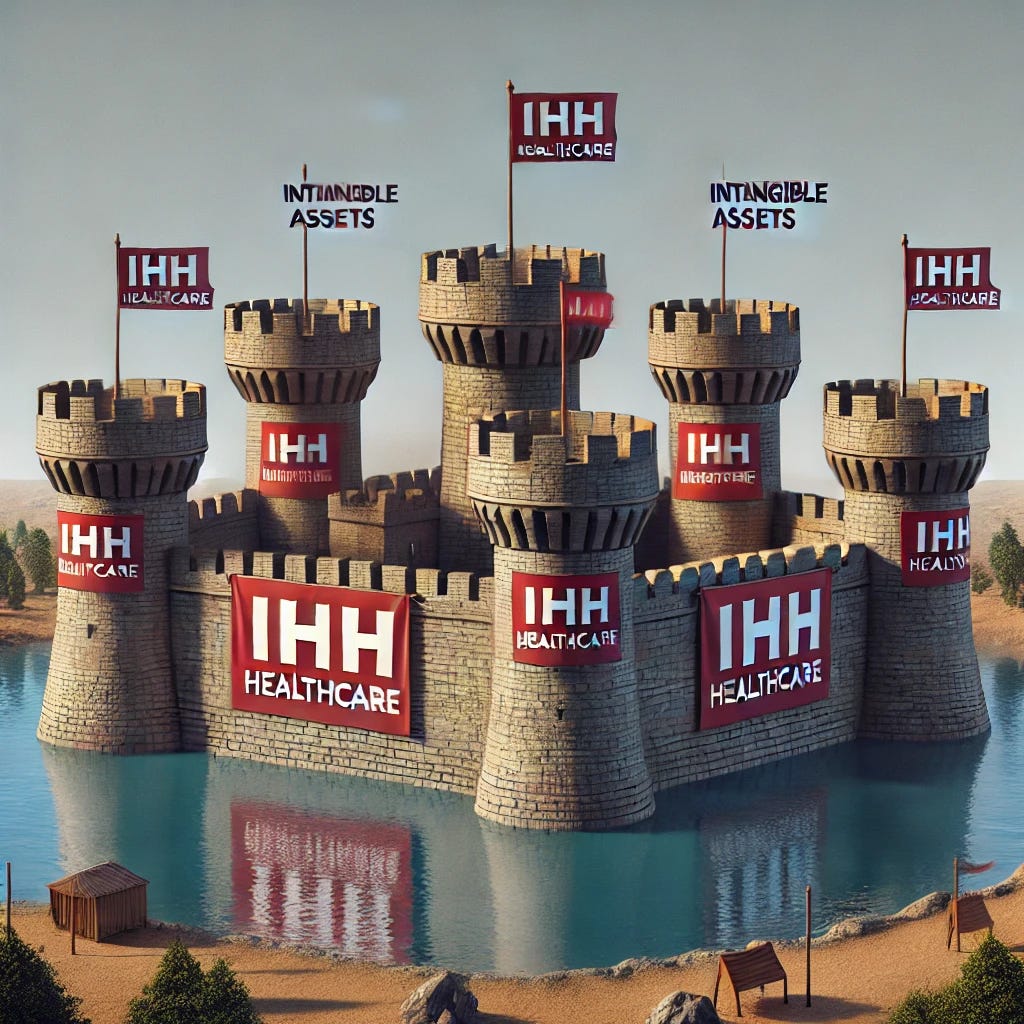IHH Healthcare: How Strong is its Economic Moat?
KingKKK
Publish date: Fri, 07 Feb 2025, 11:46 AM
An Economic Moat refers to a company's sustainable competitive advantage that protects its profits and market share from competitors over the long term. Coined by Warren Buffett, it symbolizes the "moat" around a business that fends off threats like competition, new entrants, or industry changes. Moats can arise from factors like strong brand loyalty, cost advantages, high switching costs, network effects, proprietary technology, or regulatory protections. A wider moat indicates a stronger ability to maintain profitability.

How strong is IHH Healthcare Economic Moat?
1. Brand Strength & Customer Loyalty – Very Strong
IHH Healthcare owns premium hospital brands like Parkway, Mount Elizabeth, Gleneagles, and Acibadem, which are well-regarded for high-quality healthcare services. Its strong brand recognition attracts medical tourists and high-income patients, particularly in Singapore and Malaysia. The brand strength in key markets is a significant advantage, but it does not command the same level of patient loyalty as top-tier pharmaceutical companies.
2. Cost Advantage – Above Average
IHH benefits from economies of scale due to its large hospital network, which helps in procurement and operational efficiency. However, healthcare is inherently a high-cost industry (doctors, equipment, and regulatory compliance). It faces cost pressures from inflation, staffing costs, and medical supply expenses, limiting a substantial cost advantage over competitors.
3. Switching Costs – Strong
Patients tend to stick with trusted healthcare providers, especially for long-term treatments, complex surgeries, and specialist care. However, general healthcare services have lower switching costs, as patients can opt for alternative hospitals based on pricing, insurance coverage, or location. The presence of government hospitals offering subsidized care also limits switching costs in certain markets.
4. Network Effect – Average
Unlike tech or platform businesses, hospitals do not have strong network effects. However, IHH benefits from doctor referrals and insurance partnerships, which create a mild form of a network effect. The more specialists and top-tier doctors it attracts, the more patients seek treatment there, reinforcing a cycle of quality care. But this effect is limited to reputation-driven factors rather than structural advantages.
5. Intangible Assets – Very Strong
IHH has strong regulatory licenses, JCI-accredited hospitals, and exclusive operating rights in key locations, which provide barriers to entry. Additionally, medical expertise, reputation, and research partnerships enhance its intangible asset base. However, intellectual property is not a major differentiator in the hospital industry compared to pharmaceuticals or biotech firms.
6. Financial Strength & Market Position – Very Strong
IHH has a strong balance sheet, solid cash flow, and a dominant market position in Southeast Asia and Turkey. It has demonstrated resilience through economic cycles and continues expanding through acquisitions and organic growth. However, it does have debt from past acquisitions, and healthcare is a capital-intensive industry, which requires ongoing investment in hospital expansions and upgrades.
7. Competitive Threats – Average
IHH faces competition from local hospital groups, public healthcare systems, and medical tourism destinations (Thailand, India, etc.). Governments expanding public healthcare and new entrants in private healthcare (e.g., Ramsay Sime Darby, KPJ) present challenges. Additionally, pricing regulations and insurance changes could impact margins. While IHH remains competitive, it does not have monopolistic power in any single market.
Final Moat Rating: Strong Moat
IHH Healthcare has a strong economic moat, supported by strong branding, intangible assets, and financial strength. However, cost pressures, limited switching costs, and competitive threats prevent it from having a exceptional or very strong moat. The company's moat is strongest in premium healthcare markets (Singapore, Malaysia, Turkey) but weaker in price-sensitive regions (India, China).
More stock ideas?
For more stock ideas and to receive this article directly in your email once published, visit https://kingkkk.substack.com/.
For this post, subscriber received it earlier.
My portfolio outperformed the FBMKLCI in 2024. I am ranked 17th out of 76 investors on i3, with a 25.4% return (FBMKLCI: 12.9%).
More articles on Stock Market Enthusiast


Created by KingKKK | Feb 05, 2025



Created by KingKKK | Feb 01, 2025

Created by KingKKK | Jan 31, 2025






















KingKKK
IHH Healthcare: How Strong is its Economic Moat?
https://klse.i3investor.com/web/blog/detail/bestStocks/2025-02-07-story-h498591268-IHH_Healthcare_How_Strong_is_its_Economic_Moat
6 hours ago